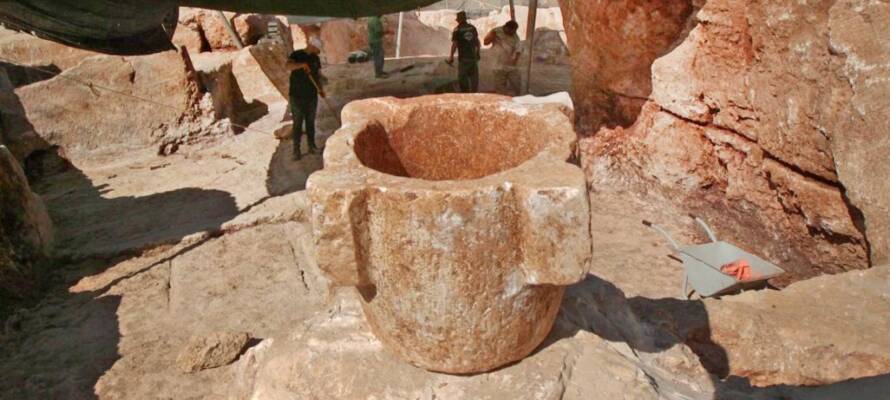The project has brought to light tens of various-sized building stones, along with quarrying and cutting trenches that outline the size of the blocks extracted.
By Pesach Benson, TPS
One of the largest quarries ever found in Jerusalem was discovered in a hi-tech park, providing a glimpse into the city’s Second Temple period, the Israeli Antiquities Authority said on Thursday.
“Revealing this huge quarry, just before the Nine Days and the Ninth of Av, the time of year when the Jewish people the world over mourn the Jerusalem that was lost in these days, is symbolic and very moving,” said Antiquities Authority Director Eli Escusido.
The ninth day of the Hebrew month of Av, which begins at sundown on Monday, marks the anniversary of the destruction of the First and Second Temples.
The excavation site in the Har Hotzvim hi-tech park spans approximately 3,500 square meters, representing just a portion of the expansive quarry.
The project has brought to light tens of various-sized building stones, along with quarrying and cutting trenches that outline the size of the blocks extracted.
The stones uncovered include massive rock slabs, measuring up to 2.5 meters in length, 1.2 meters in width, and 40 centimeters in thickness, each weighing around two-and-a-half tons.
“Most of the building stones extracted from here were huge rock slabs, likely intended for Jerusalem’s many royal construction projects during the late Second Temple period,” explained excavation directors Michael Chernin and Lara Shilov.
These monumental construction efforts began under King Herod the Great’s reign (37-4 BCE), known for expanding the Temple Mount area and constructing various public buildings, palaces, and fortifications.
The construction continued under Herod’s successors, including the Third Wall by his grandson, King Agrippa I (37-44 CE).
The quarry’s connection to other significant sites in Jerusalem has also been established.
“It is reasonable to assume that at least some of the building stones extracted here were used as pavement slabs for Jerusalem’s streets during that period,” Chernin and Shilov said.
An ongoing excavation in the City of David discovered a paved street, the “Pilgrim’s Road,” dated to the late Second Temple period.
The paving stones from this street match the size, thickness, and geological signature of the stone slabs from the Har Hotzvim quarry.
Adding to the significance of the find, two stone vessels were discovered, which, according to Jewish law, are impervious to ritual defilement.
Such vessels are indicative of a Jewish population. One of these vessels, an intact stone purification receptacle, was found hidden in a corner of the quarry.
“This is a stone purification vessel of the type that served the Jewish community during the Second Temple period,” Shilov noted.
It isn’t clear if the vessel was produced at the quarry or brought there for the workers’ use.
The Antiquities Authority is working with the developer to preserve and integrate the quarry into the commercial complex being planned.
“The entire public will gain a lasting impression of this tremendous enterprise’s grandeur – quarrying the building stones for Jerusalem when the Second Temple was standing,” said Dr. Amit Re’em, the Antiquities Authority’s Jerusalem District Supervisor.
